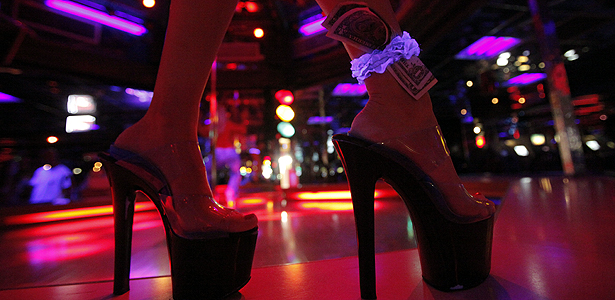Exotic dancers are fighting back against unfair wages, and last week they scored a landmark victory.
The words “labor dispute” make a lot of people imagine big men on a picket line. This, despite the fact that the high-profile workers’ struggles of the past year happened in jobs dominated by women stuck with low wages and little respect: from domestic workers securing benefits in New York state, to Chicago’s teachers’ strikes, to this week’s Black Friday actions organized across the country against Wal-Mart. There’s another group of women we should add to this list, women who have been continually fighting for their rights at work, who are met with disbelief and retaliation when they stand up, and smirking headlines and punny scorn even when they win.
Last week, strippers employed by the Spearmint Rhino chain won an unprecedented $13 million settlement in Federal court, the result of a class action suit to restore back wages and contest their status as independent contractors of the clubs. Deciding in the dancers’ favor is U.S. District Court Judge Virginia Phillips, best known for ruling “Don’t Ask, Don’t Tell” unconstitutional in 2010. It’s one of the largest financial settlements awarded to dancers at a major chain in the United States—with 20 locations worldwide, and though Spearmint Rhino would not release this information, it’s fair to estimate with several hundred if not several thousand dancers working in their clubs in the United States. In sex workers’ ongoing fight for the same rights on the job that any worker should expect, will the dancers’ case be a tipping point in the strip club business? “Spearmint Rhino is a big brand.” says Bubbles Burbujas, a stripper and one of the co-founders of the popular sex work blog Tits and Sass. “There’s no way this won’t have an effect.”
It’s definitely a big win for the 14 dancers named in the suit, but also for dancers in California. Judge Phillips ruled that within 30 days Spearmint Rhino must stop charging dancers what are known as “stage fees” for the right to work. Phillips also ruled that the chain is required to grant all dancers in their clubs employee status within six months, ending the illegal practice of classifying dancers as independent contractors while also placing workplace demands on them that far exceed that legal status. By managing dancers like employees but putting them on the books as independent contractors, club owners get out of paying dancers the benefits they’re legally entitled to, which could include worker’s compensation, unemployment, and health insurance if they qualify. Owners and management alike tell dancers they’re independent, but they still exercise control over dancers on the job, routinely using the kinds of restrictive rules on breaks and conduct you’ve come to expect of Wal-Mart, not the mythically “anything goes” world of sex work.
“This is a great result,” says attorney Shannon Liss-Riordan, who who specializes in tipped employees and independent contractor misclassification cases, and has represented dancers in class action law suits in several states. “It will put a lot of money in the pockets of women in this industry, but it will also send a clear message to clubs across this country that they should not misclassify dancers as independent contractors. When they look at these numbers in these lawsuits, they realize it’s not worth it.”
Dancers have brought suit after suit over illegal tip-sharing and misclassification as independent contractors for over 15 years now, starting with a string of high profile settlements in California in the late 1990’s, leading to the founding of the Exotic Dancers’ Alliance. (Disclosure: I’m not only a writer, but I was also a member of the Exotic Dancers Union, SEIU Local 790, from 2003 to 2006. “No justice, no piece.”) At the same time, corporate chains like Spearmint Rhino, Deja Vu, and others have been buying up or pricing out the smaller clubs that tended towards giving dancers more control at work. The corporate consolidation of strip clubs is not that different than what’s hit small businesses all over the country, only almost no one stood up to chase the Hustler Club out of town on a workers’-rights platform.
Unfortunately, when dancers win settlements for back wages, if the suits don’t make it to trial, they have limited effect to set precedent and make sustained change the business. Hima B., a former dancer and the director of License to Pimp, a documentary about strippers and labor conditions, reported that clubs just institute new policies to illegally take dancers’ tips, like several clubs in San Francisco using “piece rate” systems and quotas, where dancers must perform a set number of lap dances each shift, giving the house a percentage of each dance.
In response to a class action suit against a neighboring strip club in Montana, said Bubbles Burbujas, the club where she works started giving dancers paychecks—but management still illegally retained a portion of dancers’ tips. Dancers in this club who were earning the same per shift before the lawsuits were also now going home with less. Before the move to the paycheck system, dancers paid a $25 stage fee per shift, as well as tips to bouncers and the DJ, “but we kept the rest of our dance money,” she explained. “Now you hand over $70 of the first $100 you make, and you get a minimum wage paycheck, where you get back 30 percent or 40 percent of that.”
“These are problems where there is no good legal recourse for dancers,” said Burbujas. “You can sue to get wages and health benefits, but look at the way wage employees are already treated in this country—it’s not very good. It’s not like you’re going to be treated any better.”
As its currently organized, stripping is service work—and not unlike most service work in the United States, it’s a field dominated by women who have to fight to be treated fairly. Even in a strip club where she was getting a pay check, Mariko Passion, a former dancer and current escort and artist, said, “I was still being charged $80 every day to work there, not including my tip-out,” additional fees to be paid to DJ’s and other club service staff. Dancers’ tips can vary widely, depending on factors as unpredictable as customer whims and volume, to banal concerns like rain and football. On a shift where you pull in eight $20 dances (that’s $160 before tip-out, for your back of the cocktail napkin math), an $80 “stage fee” per shift means you just gave half your earnings to your bosses. You might feel differently if you get twenty dances or a big tipper, but the stakes are the same every shift, and they’re rigged to maximize club profits. “But restaurants can try to do exactly the same thing with your tips,” says Passion, who brought her own individual suit over illegal tip sharing and won against three California clubs. “It’s not just a strip club thing. It’s a capitalist thing.”
Lawsuits like these are one of the more powerful tools dancers have to recover stolen earnings, and they represent just one possible step towards the kind of collective organizing that could ensure dancers’ rights for the long-term. If you can imagine and appreciate the obstacles workers at megachains face in fighting for fair wages, now imagine what the strip club picket line looks like. The small pool of dancers who will risk their jobs over workplace organizing is further limited by what dancers can risk outing themselves to their friends, family and others as sex workers in the process. The price of speaking out isn’t just the “whore stigma” that all sex workers face; it could also mean discrimination at dancers’ other jobs or future jobs (thanks, Google), or could provide a bogus rationale for a dancer to lose custody of her children to a former partner or the state. It could even put dancers on the vice unit’s radar, depending where they work and how aggressive anti-prostitution policing is in their community.
“In any employment case, it takes a very strong employee to challenge them for doing something illegal,” said Liss-Riordan, “but in the strip club industry it’s particularly difficult for women to step forward. For those cases that resolve successfully, it’s a real tribute to women who are able to battle it out and fight for their rights.”
In most cases, at the first sign of dancers getting organized, a club will just make working there impossible for them. When Rachel Aimee and other dancers at a New York club raised objections to a new stage fee levied against them, the owners banned them from selling lap dances, “thus taking away our primary means of making money,” writes Aimee at In These Times. “A few weeks later, the owner fired me and another dancer, whom he took to be the instigators, and re-introduced the house fee.”
Legally speaking, it’s retaliation, sure—but who is going to enforce the National Labor Relations Act at the tip rail? (And if you do know who, spread the word. So far only one union represents a strip club in the United States.)
Dancers may dispute how to get the strip clubs to give them their fair share of their earnings, but their fight for control over their working conditions is the point—not to abolish the industry, as some women’s right activists want to do. Dancers aren’t taking the potential risks associated with outing themselves to file lawsuits or to organize necessarily because they want to defend stripping as an institution; they’re defending, as many women have and many more must, their right to earn a good living.
Rachel Aimee is no longer a dancer, but she’s still organizing, with the grassroots group We Are Dancers. “We’re trying to raise awareness among dancers of their legal rights,” Aimee told me, “so that dancers can make up their own minds whether and how they want to take action against their clubs.” With current and former dancers, they’re developing an educational website and “know your rights” booklets, translated into Spanish, Portuguese, and Russian to distribute in clubs across New York City.
No matter how dancers decide to defend their labor rights, knowing that other dancers have each other’s back is the bottom line. “A lot of people who had gone through this treatment at work had made me think that was unique to stripping,” said Mariko Passion, “but it’s not. It’s everywhere. But we’re somehow supposed to feel more violated when it’s stripping? Even more than if you’re cleaning toilets? I wish we could encourage more women to fight back.”







